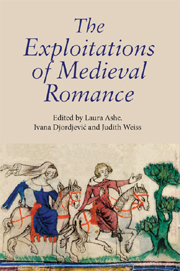Book contents
- Frontmatter
- Contents
- Preface
- Notes on Contributors
- Abbreviations and Editorial Note
- Introduction
- 1 The Fairies in the Fountain: Promiscuous Liaisons
- 2 Saracens and Other Saxons: Using, Misusing, and Confusing Names in Gui de Warewic and Guy of Warwick
- 3 The Exploitation of Ideas of Pilgrimage and Sainthood in Gui de Warewic
- 4 Chanson de geste as Romance in England
- 5 Patterns of Availability and Demand in Middle English Translations de romanz
- 6 Reading a Christian–Saracen Debate in Fifteenth-Century Middle English Charlemagne Romance: The Case of Turpines Story
- 7 Subtle Crafts: Magic and Exploitation in Medieval English Romance
- 8 Meeting Grounds: Gardens in Middle English Romance
- 9 ‘Als for the worthynes of þe romance’: Exploitation of Genre in the Buik of Kyng Alexander the Conquerour
- 10 Sir Gawain and the Green Knight and the Limits of Chivalry
- Index of Manuscripts
- General Index
7 - Subtle Crafts: Magic and Exploitation in Medieval English Romance
Published online by Cambridge University Press: 12 September 2012
- Frontmatter
- Contents
- Preface
- Notes on Contributors
- Abbreviations and Editorial Note
- Introduction
- 1 The Fairies in the Fountain: Promiscuous Liaisons
- 2 Saracens and Other Saxons: Using, Misusing, and Confusing Names in Gui de Warewic and Guy of Warwick
- 3 The Exploitation of Ideas of Pilgrimage and Sainthood in Gui de Warewic
- 4 Chanson de geste as Romance in England
- 5 Patterns of Availability and Demand in Middle English Translations de romanz
- 6 Reading a Christian–Saracen Debate in Fifteenth-Century Middle English Charlemagne Romance: The Case of Turpines Story
- 7 Subtle Crafts: Magic and Exploitation in Medieval English Romance
- 8 Meeting Grounds: Gardens in Middle English Romance
- 9 ‘Als for the worthynes of þe romance’: Exploitation of Genre in the Buik of Kyng Alexander the Conquerour
- 10 Sir Gawain and the Green Knight and the Limits of Chivalry
- Index of Manuscripts
- General Index
Summary
Magic in romance is most obviously related to the exotic and the marvellous, the expectation of the surprising and the strange. Magical adventure and encounter with those who possess supernatural powers are essential building blocks of romance narratives. These motifs endure in modern and post-modern forms of romance, powerfully present, for instance, in the adventures of Harry Potter, or the fantasy worlds created by Tolkien and Philip Pullman. Part of the enduring appeal of magic, however, is that it also goes beyond the exotic: its effects are both wonderful and fearful. The topos offers the potential for endless exploitation, and is at the same time intimately connected with the subject of exploitation: magical knowledge offers secret, unfair or unpredictable power over others, and is often both manipulative and dangerous. This essay will consider the exploitations of magic in Middle English romance, and the ways these interweave with the idea of magic as exploitation. Magic allows for the exploitation of the individual by lovers, rivals or opponents, and hence the shaping of narratives of adventure, challenge and test. The motif of exploitation through supernatural means opens up questions of intention and morality, and can also lead to the transgression of typical gender roles. Magic colours and complicates romance for it is morally ambiguous: romance writers probe the status of occult learning, and the dangers as well as the attractions of illicit, potentially harmful or transformative knowledge.
- Type
- Chapter
- Information
- The Exploitations of Medieval Romance , pp. 108 - 124Publisher: Boydell & BrewerPrint publication year: 2010



